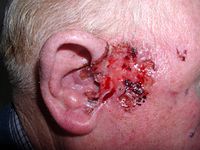
Photo from wikipedia
Histopathological image analysis is the gold standard to diagnose cancer. Carcinoma is a subtype of cancer that constitutes more than 80% of all cancer cases. Squamous cell carcinoma and adenocarcinoma… Click to show full abstract
Histopathological image analysis is the gold standard to diagnose cancer. Carcinoma is a subtype of cancer that constitutes more than 80% of all cancer cases. Squamous cell carcinoma and adenocarcinoma are two major subtypes of carcinoma, diagnosed by microscopic study of biopsy slides. However, manual microscopic evaluation is a subjective and time-consuming process. Many researchers have reported methods to automate carcinoma detection and classification. The increasing use of artificial intelligence (AI) in the automation of carcinoma diagnosis also reveals a significant rise in the use of deep network models. In this systematic literature review, we present a comprehensive review of the state-of-the-art approaches reported in carcinoma diagnosis using histopathological images. Studies are selected from well-known databases with strict inclusion/exclusion criteria. We have categorized the articles and recapitulated their methods based on specific organs of carcinoma origin. Further, we have summarized pertinent literature on AI methods, highlighted critical challenges and limitations, and provided insights on future research direction in automated carcinoma diagnosis. Out of 101 articles selected, most of the studies experimented on private datasets with varied image sizes, obtaining accuracy between 63% and 100%. Overall, this review highlights the need for a generalized AI-based carcinoma diagnostic system. Additionally, it is desirable to have accountable approaches to extract microscopic features from images of multiple magnifications that should mimic pathologists' evaluations.
Journal Title: Computers in biology and medicine
Year Published: 2022
Link to full text (if available)
Share on Social Media: Sign Up to like & get
recommendations!